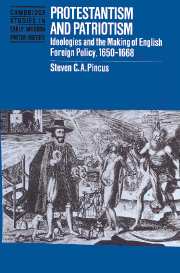Book contents
- Frontmatter
- Contents
- Acknowledgments
- List of abbreviations
- 1 Introduction
- Part I The rod of the Lord: ideology and the outbreak of the First Anglo-Dutch War
- 2 Historiographical overview
- 3 The attempt at unification
- 4 The road to war
- Part II To unite against the common enemy: the 1654 Treaty of Westminster and the end of apocalyptic foreign policy
- Part III Popery, trade, and universal monarchy: ideology and the outbreak of the Second Anglo-Dutch War
- Part IV The Medway, Breda, and the Triple Alliance: the collapse of Anglican Royalist Foreign Policy
- Conclusion
- Bibliography
- Index
- Titles in the series
3 - The attempt at unification
Published online by Cambridge University Press: 01 October 2009
- Frontmatter
- Contents
- Acknowledgments
- List of abbreviations
- 1 Introduction
- Part I The rod of the Lord: ideology and the outbreak of the First Anglo-Dutch War
- 2 Historiographical overview
- 3 The attempt at unification
- 4 The road to war
- Part II To unite against the common enemy: the 1654 Treaty of Westminster and the end of apocalyptic foreign policy
- Part III Popery, trade, and universal monarchy: ideology and the outbreak of the Second Anglo-Dutch War
- Part IV The Medway, Breda, and the Triple Alliance: the collapse of Anglican Royalist Foreign Policy
- Conclusion
- Bibliography
- Index
- Titles in the series
Summary
In order to understand the ideological development of Anglo-Dutch relations 1650–1652, it is necessary to begin with the mission of Walter Strickland and Oliver St. John to the United Provinces in the spring of 1651. Why did the Council of State see fit to send the extraordinary ambassadors? What were their aims?
Despite Parliamentary professions of friendship, the Orangist-dominated States General had refused to recognize the English Republic. Although the provincial government of Holland had effectively prevented the Stadholder William II from aiding his brother-in-law Charles II, Parliament's ambassadors were refused audience by the States General, and one – Dr. Dorislaus – had been cruelly murdered in The Hague. The Rump was right to insist that “the fault hath not been in them” that closer relations had not been established. In the summer and autumn William II began conducting an aggressive and largely successful campaign to compel the resistant provinces, especially Holland, to support his policies. Dutch pro-Stuart neutrality in the English war against Scotland looked as if it would soon become active hostility. In the wake of William's attack on Amsterdam, the Mercurius Politicus warned that it would not be long before the Dutch “show their teeth at England.” Fortunately for the Rump, William II suddenly died from smallpox just as he was poised to intervene in British affairs.
Immediately after William's death two Dutch pamphlets appeared in England – A Faithfull Advertisement to all Good Patriots of the United Provinces, in the present Conjunctures Since the Death of the Prince of Orange and The Troubles of Amsterdam – explaining the recent developments in the Netherlands.
- Type
- Chapter
- Information
- Protestantism and PatriotismIdeologies and the Making of English Foreign Policy, 1650–1668, pp. 15 - 39Publisher: Cambridge University PressPrint publication year: 1996
- 3
- Cited by



